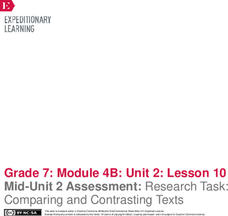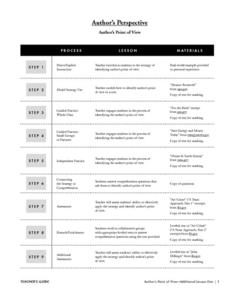Hood River County School District
Text Structure: Features and Organization
Teach learners how to interact with both fiction and non-fiction text with a packet of activities and worksheets. After looking over text structure and the difference in text features between different types of writing, readers analyze...
Curated OER
Comprehension: Create a Summary from an Expository Text
Children can learn to analyze expository or informational texts at nearly any age. This scaffolded and scripted resource provides teachers with the support needed to facilitate a thoughtful lesson plan on summarizing informational text...
Fluence Learning
Writing About Informational Text: The Dred Scott Decision
Looking for a performance assessment that asks individuals to demonstrate their competency in writing about informational text? Use Frederick Douglass' essay "On the Dred Scott Decision," and an excerpt from Abraham Lincoln's 1857 speech...
Ontario
Reading Informational Text
Learning to recognize the importance of the features of information text (i.e., titles, subtitles, endnotes, sidebars, etc.) is the focus of a reading activity designed for middle schoolers. Learners examine how these text features help...
Ontario
Reading Graphic Text
Do learners really need to be taught how to read cartoons, comic books, and comic strips? Yes. Just as they need to learn how to read other forms of graphic text such as diagrams, photos, timetables, maps, charts, and tables. Young...
Florida Center for Reading Research
Comprehension: Text Analysis, Compare and Contrast
Grab any two topics, some index cards, and a couple of kids, and you're ready to compare and contrast! The resource provides instructions for this method and three graphic organizers in addition to or in place of the index cards.
EngageNY
Taking Notes Using a Graphic Organizer: Inferring About the Importance of Religion in Colonial America
Improve class understanding of colonial times by reading an informational text and filling out the accompanying graphic organizer. Class members work with a partner to read, take notes, make inferences, and synthesize information.The...
Curated OER
Identifying Setting Using Evidence from the Text
Help young readers find the setting in the story. They will review what a setting is with a modeled example by the teacher. After reading The Cow Who Wouldn't Come Down by Paul Brett Johnson and completing a practice sheet, they will be...
EngageNY
Research: Identifying Categories for Our Research About the Wheelwright
Here is a fine lesson plan on reading and understanding expository text designed for 4th graders. With a partner, learners read a passage of text about a machine called a wheelright. This machine was commonly used in the colonial period....
Novelinks
Where the Red Fern Grows: Graphic Organizer, Story Map
How do you grow a goal from a dream to reality? You make a plan! After reading chapters two and three of Where the Red Fern Grows, learners map how Billy earns his dogs by completing an organizer in pairs and then discussing answers in...
EngageNY
Conducting Research: Analyzing Expert Texts about the Mary River Project
Pupils read informational texts about the Mary River Project, searching for the gist. As they read the expert texts, they complete a graphic organizer to identify and analyze point of view.
EngageNY
Mid-Unit 2 Assessment: Research Task: Comparing and Contrasting Texts
It's the half-way mark! Pupils demonstrate understanding of unit standards by completing a mid-unit assessment. After reading an informational article about water management strategies, scholars complete a graphic organizer to identify...
EngageNY
Identifying Author’s Opinion and Evidence: The Value of Sports in People’s Lives, Part I
Just like instant replay, it's time to take a closer look! Pupils work together to add ideas to a Close Readers Do These Things anchor chart. They then put their knowledge to the test as they read an informational article about the...
National Council of Teachers of English
Timelines and Texts: Motivating Students to Read Nonfiction
With the emphasis on incorporating more nonfiction in language arts classes the question arises about how to design activities that motivate kids to engage with informational text. How about an assignment that asks class members to...
EngageNY
Grade 9 ELA Module 2, Unit 2, Lesson 3
The manipulation of time is one of the most essential elements in Sophocles' Oedipus the King. As your language arts class participates in a jigsaw discussion activity, they work together to analyze the play's plot structure and...
Columbus City Schools
Get Your Organisms Organized
From large to small, show your class how to organize them all! Included within the guide is everything you need to take their knowledge of classification from the cellular to the species level. The worksheets focus on building vocabulary...
EngageNY
Taking Notes Using a Graphic Organizer: Inferring About Work and Play in Colonial America
What was life like in colonial America? Follow this lesson plan and your pupils will find out what people in colonial times did for work and for fun. Ask learners to compare and contrast the two texts and explain what the reading helped...
Ontario
Critical Literacy—Media Texts
Media texts convey both overt and implied messages. As part of their study of media, class members analyze the language, form, techniques, and aesthetics in a variety of media texts.
Take 10
Author’s Perspective
Gradually build understanding of author's point of view through a scaffolded set of exercises. Moving from direct instruction, to collaborative work, and eventually to independent practice, these steps will assist your class in grasping...
Lerner Publishing
Meet the Dinosaurs
Take your class of youngsters on a prehistoric adventure with this four-lesson series on dinosaurs. Accompanying the Meet the Dinosaurs books by Don Lessem, these lessons engage children in writing their own dinosaur books, making...
Curated OER
Ornithology and Real World Science
Double click that mouse because you just found an amazing lesson! This cross-curricular Ornithology lesson incorporates literature, writing, reading informational text, data collection, scientific inquiry, Internet research, art, and...
CC Homestead
Summarize
Designed for third graders but appropriate for older learners as well, this packet of materials underscores the necessity of teaching kids how to summarize, how to identify main ideas and supporting details, and how to ask questions...
Institute for the Professional Development of Adult Educators
Using Context Clues with Signal Words
When you come across an unfamiliar word in a text, do you skip it and move on? Practice using context clues to identify words you don't know with a thorough set of language arts lessons. The resource reinforces close reading and critical...
Bantam Books
The Tempest: Think-Aloud Annotation
It can be difficult to refer back to a text when analyzing it, so annotation is a great tool for kids to track what they are reading. A thorough and well-organized lesson guides learners through the process of annotating William...

























